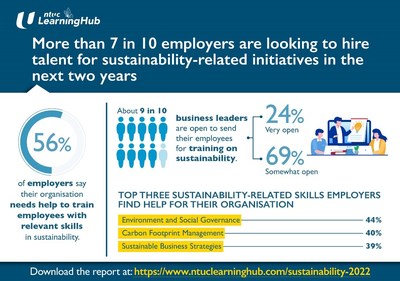
- More than half (56%) of employers share that their organisation needs help to train employees with relevant skills, with 24% ‘very open’ and 69% ‘somewhat open’ to sending their employees for training on sustainability
- The top three sustainability-related skills employers find helpful for their organisation are Environment and Social Governance (44%), Carbon Footprint Management (40%) and Sustainable Business Strategies (39%)
- The top three in-demand Critical Core Skills that supplement sustainability initiatives regardless of sector and job roles include Problem Solving (52%), Creative thinking (44%) and Collaboration (44%)
SINGAPORE, Aug. 3, 2022 /PRNewswire/ — With the increasing emphasis on integrating sustainability into business models and operations, demand for talent in sustainability is set to intensify. According to NTUC LearningHub, more than seven in ten employers (77%) reveal that they are looking to hire talent for sustainability-related initiatives in the next two years, with the demand for specialised talent in the environmental space outpacing that of the social and governance arms of sustainability.
In fact, employers are ‘very open’ (24%) and ‘somewhat open’ (69%) to sending their employees for sustainability training. However, more than half (56%) of business leaders surveyed share that their organisation needs help to train employees with relevant skills in sustainability.
These are some of the key findings from NTUC LearningHub’s recently launched Special Report 2022 on Sustainability, which aims to uncover the importance of implementing sustainable business practices, the demand for sustainability-related talent, and the priority skills required of employees by companies embarking on their sustainability journey.
The report is based on a survey of 200 business leaders across different industries in Singapore, and interviews with industry practitioners and experts from NTUC LearningHub. It also offers recommendations on key areas businesses can focus on in implementing sustainability initiatives.
The top three skills related to sustainability that employers say would be useful for their organisation are Environment and Social Governance (44%), followed by Carbon Footprint Management (40%) and Sustainable Business Strategies (39%). In addition to domain knowledge in sustainability, business leaders also consider the value Critical Core Skills can bring in the development of sustainability initiatives, regardless of sector or job roles. The top three Critical Core Skills include Problem Solving (52%), Creative thinking (44%) and Collaboration (44%).
In driving change, two in five employers (39%) say that the C-suite Management team should be the key stakeholder responsible for driving and overseeing sustainability strategies. As for implementing sustainability initiatives, 59% of business leaders believe that a dedicated sustainability committee should be responsible for implementing sustainability initiatives in their organisation.
Commenting on the report findings, Tay Ee Learn, NTUC LearningHub’s Director of Technical Skills Product Division, says, “Sustainability is a very new concept for many companies. With the growing call to integrate sustainable practices into business models, companies will inevitably be looking for talents to help them develop products or adopt new technologies to support their sustainable initiatives. Employers could consider recruiting new talents or developing their current workforce by equipping them with the right skills. For jobseekers, they can ride on this emerging trend and enrol in relevant training courses to equip themselves with the necessary skills as companies embarking on their sustainability journey will be starting to look for talents in this space.”
To download the Special Report 2022 on Sustainability, please visit https://www.ntuclearninghub.com/sustainability-2022. To find out more about the courses, training, and grants, please contact NTUC LearningHub at www.ntuclearninghub.com.
About NTUC LearningHub
NTUC LearningHub is the leading Continuing Education and Training provider in Singapore which aims to transform the lifelong employability of working people. Since our corporatisation in 2004, we have been working with employers and individual learners to provide learning solutions in areas such as Cloud, Infocomm Technology, Healthcare, Employability & Literacy, Business Excellence, Workplace Safety & Health, Security, Human Resources and Foreign Worker Training.
To date, NTUC LearningHub has helped over 26,000 organisations and achieved more than 2.6 million training places across more than 2,900 courses with a pool of about 900 certified trainers. As a Total Learning Solutions provider to organisations, we also forge partnerships to offer a wide range of relevant end-to-end training. Besides in-person training, we also offer instructor-led virtual live classes (VLCs) and asynchronous online learning. The NTUC LearningHub Learning eXperience Platform (LXP) — a one-stop online learning mobile application — offers timely, bite-sized and quality content for learners to upskill anytime and anywhere. Beyond learning, LXP also serves as a platform for jobs and skills development for both workers and companies.
For more information, visit www.ntuclearninghub.com.
Press Contact
Zulaikha Zulkiflee
Assistant Manager, Brand & Communications
Email: zulaikha@ntuclearninghub.com
Mobile: +65 9026 9143
Gabriel J. Tan
Senior Executive, Public Relations
Email: gabriel.tan@ntuclearninghub.com
Mobile: +65 9841 4206
SOURCE NTUC LearningHub
Source link
The content is by PR Newswire. Headlines of Today Media is not responsible for the content provided or any links related to this content. Headlines of Today Media is not responsible for the correctness, topicality or the quality of the content.



